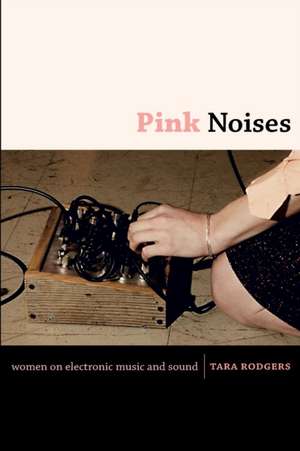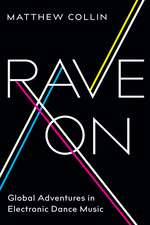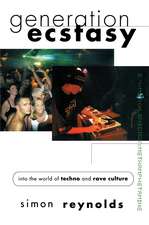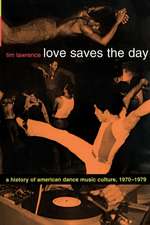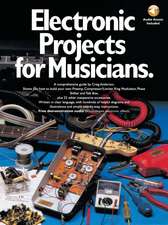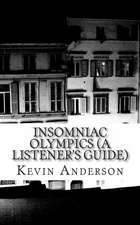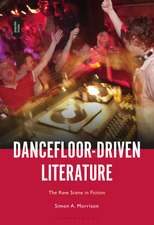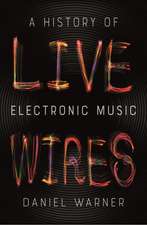Pink Noises – Women on Electronic Music and Sound
Autor Tara Rodgersen Limba Engleză Paperback – 22 mar 2010
Preț: 193.83 lei
Nou
Puncte Express: 291
Preț estimativ în valută:
37.10€ • 40.31$ • 31.19£
37.10€ • 40.31$ • 31.19£
Carte disponibilă
Livrare economică 01-15 aprilie
Livrare express 15-21 martie pentru 29.93 lei
Preluare comenzi: 021 569.72.76
Specificații
ISBN-13: 9780822346739
ISBN-10: 0822346737
Pagini: 336
Ilustrații: 38 illustrations
Dimensiuni: 144 x 235 x 19 mm
Greutate: 0.45 kg
Editura: MD – Duke University Press
ISBN-10: 0822346737
Pagini: 336
Ilustrații: 38 illustrations
Dimensiuni: 144 x 235 x 19 mm
Greutate: 0.45 kg
Editura: MD – Duke University Press
Recenzii
Pink Noises is a breath of fresh air when you look at how many electronic music books are about more of the same: boys with toys. From the Middle Easterninflected electronica of DJ Mutamassik, to the Punjabi rhythms of DJ Rekha, to the academix of Pamela Z and Pauline Oliveros, Tara Rodgerss examination of women as central figures in the creative processes of twenty-first-century art and music is a must-read for anyone who cares about the future of music in our hyper-connected and hyper-post-everything contemporary life.--Paul D. Miller, aka DJ Spooky
A wonderfully diverse international mix of interviews, essays, reviews, and links.--Michael Paoletta, Billboard
Great practical advice on music making.--URB
Everything you ever wanted to know about electronic music and the women making it.--Tamara Warren, Nylon
Pinknoises doesnt just talk girl power, they enable it.--Soo-Hyun Chung, Mixer
Acknowledges womens space in the world of electronic music and celebrates it with information, education, and innovation.--Flavorpill
Go girls!--Anne Hilde Neset, The Wire
Rodgers clearly understands many disparate modes of music making, and sounds equally authoritative whether she's talking about elaborate programming schemes, the language of analog synthesizers, or record buying. She doesn't shy away from the occasional use of technical language, but the talks are generally clear and lucid. - Chicago Reader
Overall, though, the books weaving of cultural theory, biography and personal experience is cogent in its readability, revelations and range of perspectives. And while it is not meant to be a comprehensive history of women in electronic music, it fills a much needed gap in the coverage of women in experimental and improvised music, it fills a much needed gap in the coverage of women in experimental and improvised music, in particular. With its in-depth discussions of technical equipment, the book also severs as a resource for practising musicians and leaves open the possibility of inspiring the uninitiated to plug in and turn on. The Wire
[T]he interviews offer rich, multi-generational accounts of lives spent creating in the field of electronic music. . . . One of the signal values of the book is the multiplicity of practices it encapsulates. . . . Again and again the books presentation of such neglected variety implicitly highlights the degree to which the standard story of electronic music history has been weighted on the side of male innovation and production.Nichola Scrutton, Popular Music
The introductory essay is smart, political, thorough, thoughtful and filled with interesting references. . . . Acknowledging labourers, manufacturers, producers, musicians, composers, listeners, consumers and attendees as contributors to electronic music, Rodgers cracks open a narrow divide of written history and offers an inspiring read and dialogue for readers to engage in.Deanna Radford, Herizons
[A] good book that champions the musical output of a variety of female electronic instrumentalists who continue to challenge how we conceptualize popular music.Feminist Music Geek
[A] welcome rethinking of the theory and practice of electronic aesthetics. . . . Though this volume cannot ultimately resolve the questions raised by the inherent conceptual incongruity between female difference and sonic difference (and given their disjunction, how could it?), the collective exuberance, eloquence, and authority conjured up within these conversations is ample compensation. Drew Daniel, Journal of Popular Music Studies
"Pink Noises is a breath of fresh air when you look at how many electronic music books are about more of the same: boys with toys. From the Middle Eastern-inflected electronica of DJ Mutamassik, to the Punjabi rhythms of DJ Rekha, to the academix of Pamela Z and Pauline Oliveros, Tara Rodgers's examination of women as central figures in the creative processes of twenty-first-century art and music is a must-read for anyone who cares about the future of music in our hyper-connected and hyper-post-everything contemporary life."--Paul D. Miller, aka DJ Spooky "A wonderfully diverse international mix of interviews, essays, reviews, and links."--Michael Paoletta, Billboard "Great practical advice on music making."--URB "Everything you ever wanted to know about electronic music and the women making it."--Tamara Warren, Nylon "Pinknoises doesn't just talk girl power, they enable it."--Soo-Hyun Chung, Mixer "Acknowledges women's space in the world of electronic music and celebrates it with information, education, and innovation."--Flavorpill "Go girls!"--Anne Hilde Neset, The Wire "Rodgers clearly understands many disparate modes of music making, and sounds equally authoritative whether she's talking about elaborate programming schemes, the language of analog synthesizers, or record buying. She doesn't shy away from the occasional use of technical language, but the talks are generally clear and lucid." - Chicago Reader "Overall, though, the book's weaving of cultural theory, biography and personal experience is cogent in its readability, revelations and range of perspectives. And while it is not meant to be a comprehensive history of women in electronic music, it fills a much needed gap in the coverage of women in experimental and improvised music, it fills a much needed gap in the coverage of women in experimental and improvised music, in particular. With its in-depth discussions of technical equipment, the book also severs as a resource for practising musicians and leaves open the possibility of inspiring the uninitiated to plug in and turn on." The Wire "[T]he interviews offer rich, multi-generational accounts of lives spent creating in the field of electronic music... One of the signal values of the book is the multiplicity of practices it encapsulates... Again and again the books' presentation of such neglected variety implicitly highlights the degree to which the standard story of electronic music history has been weighted on the side of male innovation and production." - Nichola Scrutton, Popular Music "The introductory essay is smart, political, thorough, thoughtful and filled with interesting references... Acknowledging labourers, manufacturers, producers, musicians, composers, listeners, consumers and attendees as contributors to electronic music, Rodgers cracks open a narrow divide of written history and offers an inspiring read and dialogue for readers to engage in." - Deanna Radford, Herizons "[A] good book that champions the musical output of a variety of female electronic instrumentalists who continue to challenge how we conceptualize popular music." - Feminist Music Geek "[A] welcome rethinking of the theory and practice of electronic aesthetics... Though this volume cannot ultimately resolve the questions raised by the inherent conceptual incongruity between female difference and sonic difference (and given their disjunction, how could it?), the collective exuberance, eloquence, and authority conjured up within these conversations is ample compensation." - Drew Daniel, Journal of Popular Music Studies
A wonderfully diverse international mix of interviews, essays, reviews, and links.--Michael Paoletta, Billboard
Great practical advice on music making.--URB
Everything you ever wanted to know about electronic music and the women making it.--Tamara Warren, Nylon
Pinknoises doesnt just talk girl power, they enable it.--Soo-Hyun Chung, Mixer
Acknowledges womens space in the world of electronic music and celebrates it with information, education, and innovation.--Flavorpill
Go girls!--Anne Hilde Neset, The Wire
Rodgers clearly understands many disparate modes of music making, and sounds equally authoritative whether she's talking about elaborate programming schemes, the language of analog synthesizers, or record buying. She doesn't shy away from the occasional use of technical language, but the talks are generally clear and lucid. - Chicago Reader
Overall, though, the books weaving of cultural theory, biography and personal experience is cogent in its readability, revelations and range of perspectives. And while it is not meant to be a comprehensive history of women in electronic music, it fills a much needed gap in the coverage of women in experimental and improvised music, it fills a much needed gap in the coverage of women in experimental and improvised music, in particular. With its in-depth discussions of technical equipment, the book also severs as a resource for practising musicians and leaves open the possibility of inspiring the uninitiated to plug in and turn on. The Wire
[T]he interviews offer rich, multi-generational accounts of lives spent creating in the field of electronic music. . . . One of the signal values of the book is the multiplicity of practices it encapsulates. . . . Again and again the books presentation of such neglected variety implicitly highlights the degree to which the standard story of electronic music history has been weighted on the side of male innovation and production.Nichola Scrutton, Popular Music
The introductory essay is smart, political, thorough, thoughtful and filled with interesting references. . . . Acknowledging labourers, manufacturers, producers, musicians, composers, listeners, consumers and attendees as contributors to electronic music, Rodgers cracks open a narrow divide of written history and offers an inspiring read and dialogue for readers to engage in.Deanna Radford, Herizons
[A] good book that champions the musical output of a variety of female electronic instrumentalists who continue to challenge how we conceptualize popular music.Feminist Music Geek
[A] welcome rethinking of the theory and practice of electronic aesthetics. . . . Though this volume cannot ultimately resolve the questions raised by the inherent conceptual incongruity between female difference and sonic difference (and given their disjunction, how could it?), the collective exuberance, eloquence, and authority conjured up within these conversations is ample compensation. Drew Daniel, Journal of Popular Music Studies
"Pink Noises is a breath of fresh air when you look at how many electronic music books are about more of the same: boys with toys. From the Middle Eastern-inflected electronica of DJ Mutamassik, to the Punjabi rhythms of DJ Rekha, to the academix of Pamela Z and Pauline Oliveros, Tara Rodgers's examination of women as central figures in the creative processes of twenty-first-century art and music is a must-read for anyone who cares about the future of music in our hyper-connected and hyper-post-everything contemporary life."--Paul D. Miller, aka DJ Spooky "A wonderfully diverse international mix of interviews, essays, reviews, and links."--Michael Paoletta, Billboard "Great practical advice on music making."--URB "Everything you ever wanted to know about electronic music and the women making it."--Tamara Warren, Nylon "Pinknoises doesn't just talk girl power, they enable it."--Soo-Hyun Chung, Mixer "Acknowledges women's space in the world of electronic music and celebrates it with information, education, and innovation."--Flavorpill "Go girls!"--Anne Hilde Neset, The Wire "Rodgers clearly understands many disparate modes of music making, and sounds equally authoritative whether she's talking about elaborate programming schemes, the language of analog synthesizers, or record buying. She doesn't shy away from the occasional use of technical language, but the talks are generally clear and lucid." - Chicago Reader "Overall, though, the book's weaving of cultural theory, biography and personal experience is cogent in its readability, revelations and range of perspectives. And while it is not meant to be a comprehensive history of women in electronic music, it fills a much needed gap in the coverage of women in experimental and improvised music, it fills a much needed gap in the coverage of women in experimental and improvised music, in particular. With its in-depth discussions of technical equipment, the book also severs as a resource for practising musicians and leaves open the possibility of inspiring the uninitiated to plug in and turn on." The Wire "[T]he interviews offer rich, multi-generational accounts of lives spent creating in the field of electronic music... One of the signal values of the book is the multiplicity of practices it encapsulates... Again and again the books' presentation of such neglected variety implicitly highlights the degree to which the standard story of electronic music history has been weighted on the side of male innovation and production." - Nichola Scrutton, Popular Music "The introductory essay is smart, political, thorough, thoughtful and filled with interesting references... Acknowledging labourers, manufacturers, producers, musicians, composers, listeners, consumers and attendees as contributors to electronic music, Rodgers cracks open a narrow divide of written history and offers an inspiring read and dialogue for readers to engage in." - Deanna Radford, Herizons "[A] good book that champions the musical output of a variety of female electronic instrumentalists who continue to challenge how we conceptualize popular music." - Feminist Music Geek "[A] welcome rethinking of the theory and practice of electronic aesthetics... Though this volume cannot ultimately resolve the questions raised by the inherent conceptual incongruity between female difference and sonic difference (and given their disjunction, how could it?), the collective exuberance, eloquence, and authority conjured up within these conversations is ample compensation." - Drew Daniel, Journal of Popular Music Studies
Textul de pe ultima copertă
""Pink Noises" is a breath of fresh air when you look at how many electronic music books are about more of the same: boys with toys. From the Middle Eastern-inflected electronica of DJ Mutamassik, to the Punjabi rhythms of DJ Rekha, to the academix of Pamela Z and Pauline Oliveros, Tara Rodgers's examination of women as central figures in the creative processes of twenty-first-century art and music is a must-read for anyone who cares about the future of music in our hyper-connected and hyper-post-everything contemporary life."--Paul D. Miller, aka DJ Spooky
Cuprins
Acknowledgments ix
Introduction 1
Part 1. Time and Memory 25
Pauline Oliveros 27
Kaffe Matthews 34
Carla Scaletti 43
Eliane Radigue 54
Part 2. Space and Perspective 61
Maggi Payne 63
Ikue Mori 73
Beth Coleman (M. Singe) 81
Maria Chavez 94
Part 3. Nature and Synthetics 105
Christina Kubisch 107
Annea Lockwood 114
Chantal Passamonte (Mira Calix) 128
Jessica Rylan 139
Part 4. Circulation and Movements 157
Susan Morabito 159
Rekha Malhotra (DJ Rekha) 169
Giulia Loli (DJ Mtuamassik) 178
Jeannie Hopper 190
Part 5. Language, Machines, Embodiment 201
Antye Gueie (AGF) 203
Pamela Z 216
Laetitia Sonami 226
Bevin Kelley (Blevin Blectum) 235
Part 6. Alone/Together 243
Le Tigre 245
Bev Stanton (Arthur Loves Plastic) 255
Keiko Uenishi (o.blaat) 263
Riz Maslen (Neotropic) 273
Glossary 283
Discography 295
References 301
Index 313
Introduction 1
Part 1. Time and Memory 25
Pauline Oliveros 27
Kaffe Matthews 34
Carla Scaletti 43
Eliane Radigue 54
Part 2. Space and Perspective 61
Maggi Payne 63
Ikue Mori 73
Beth Coleman (M. Singe) 81
Maria Chavez 94
Part 3. Nature and Synthetics 105
Christina Kubisch 107
Annea Lockwood 114
Chantal Passamonte (Mira Calix) 128
Jessica Rylan 139
Part 4. Circulation and Movements 157
Susan Morabito 159
Rekha Malhotra (DJ Rekha) 169
Giulia Loli (DJ Mtuamassik) 178
Jeannie Hopper 190
Part 5. Language, Machines, Embodiment 201
Antye Gueie (AGF) 203
Pamela Z 216
Laetitia Sonami 226
Bevin Kelley (Blevin Blectum) 235
Part 6. Alone/Together 243
Le Tigre 245
Bev Stanton (Arthur Loves Plastic) 255
Keiko Uenishi (o.blaat) 263
Riz Maslen (Neotropic) 273
Glossary 283
Discography 295
References 301
Index 313
Descriere
Collection of interviews with women DJs, electronic musicians, and sound artists.
